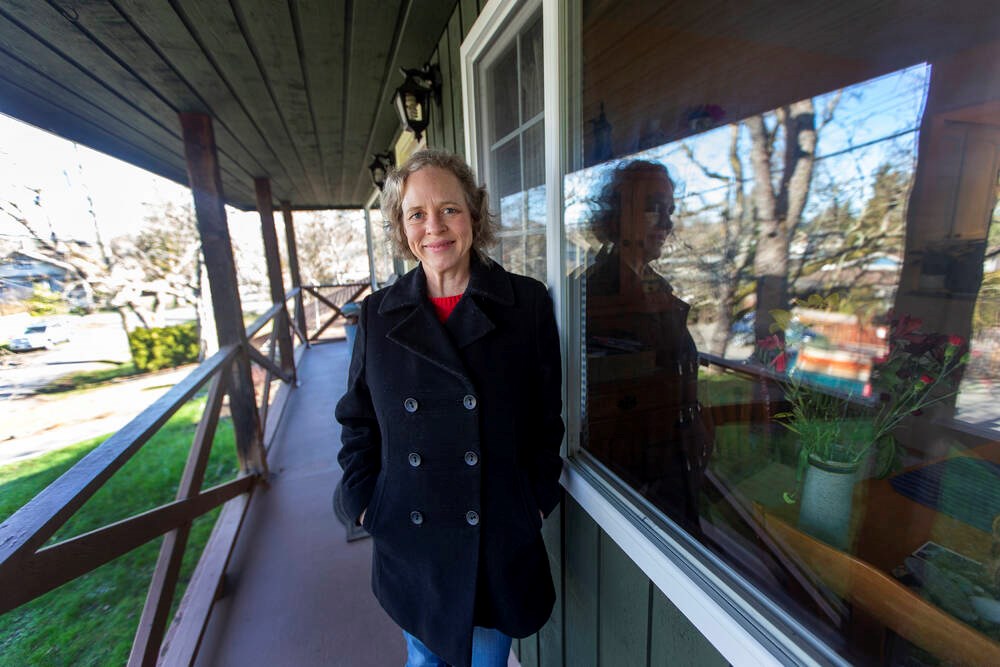
Carolyn Crampton has had a long career in the medical field, so she knew what to expect when she had breast cancer diagnosed.
Crampton, a retired ultrasound technician who worked in breast imaging, said it all goes to show that people just don’t know what is going to happen with their health.
In total, the 57-year-old worked for Island Health for 25 years before retiring three weeks ago. Her work with breast imaging came at Victoria General Hospital, the Island’s referral centre for mammograms and women’s health, and she found that the field fit her personality.
“There’s a lot of teaching and counselling on top of just doing the actual tests, and that suited me.”
Crampton’s case unfolded five years ago when she noticed an abnormality, a dimpling or puckering, on one of her breasts.
“I knew that was a sign that you need to get things checked, so I did,” she said. It turned out to be cancer.
She said her condition had not shown up on her regular mammograms because because her breasts are dense. Tissue fibres can overlap in dense breasts and keep things hidden, Crampton said.
That’s where the work of the Victoria Hospitals Foundation comes in, she said. The foundation’s Emerge Stronger Campaign is raising $10 million for more than 200 pieces of equipment that have been prioritized for Victoria General, Royal Jubilee and Gorge Road hospitals.
“Now they’re getting some equipment funded by the foundation, and it’s a mammogram machine that will help with the problem of breast density,” she said. “That’s quite a hot topic right now for women, their breast density, because it’s unique for each person.
“Women are very curious about their own breast density and what is the best way to monitor their own breasts.”
Crampton’s cancer was diagnosed by radiologist Dr. Brent Lee using an ultrasound machine and a biopsy. After that, Dr. Alison Ross performed a lumpectomy — also called a partial mastectomy — and also removed a lymph node from an armpit to check for spreading. There was none.
“So I was lucky I didn’t have to have chemotherapy,” said Crampton, who had four weeks of radiation and takes a hormone-blocking medication. “I think I got off pretty easy.”
Among the equipment being funded by the Victoria Hospitals Foundation are a $31,000 high-resolution mammography monitor, an $87,000 ultrasound machine and $99,000 breast-imaging, computer-aided detection software.
The software lets radiologists use MRI scans to diagnose breast cancers that are small and early-stage. “It helps them read a breast MRI, which is really important,” Crampton said.
She said the high-resolution monitor will help in reading mammograms.
The fact her cancer was missed doesn’t mean mammograms aren’t needed every two years, Crampton said.
“That’s the very first step in the investigation, a mammogram,” she said. “You want to see any changes over time.”
To donate to the Emerge Stronger Campaign, go to the Victoria Hospitals Foundation website at victoriahf.ca or call 250-519-1750.
jbell@timescolonist.com
"breast" - Google News
February 20, 2022 at 08:00PM
https://ift.tt/HJd19pt
Breast cancer survivor touts campaign for new hospital equipment - Times Colonist
"breast" - Google News
https://ift.tt/YoAhrHv
https://ift.tt/TMvncQF
Bagikan Berita Ini














0 Response to "Breast cancer survivor touts campaign for new hospital equipment - Times Colonist"
Post a Comment